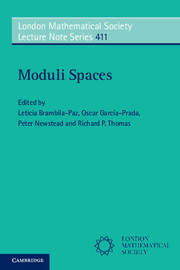Book contents
- Frontmatter
- Contents
- Preface
- List of contributors
- 1 Introduction to algebraic stacks
- 2 BPS states and the P = W conjecture
- 3 Representations of surface groups and Higgs bundles
- 4 Introduction to stability conditions
- 5 An introduction to d-manifolds and derived differential geometry
- 6 13/2 ways of counting curves
Preface
Published online by Cambridge University Press: 05 April 2014
- Frontmatter
- Contents
- Preface
- List of contributors
- 1 Introduction to algebraic stacks
- 2 BPS states and the P = W conjecture
- 3 Representations of surface groups and Higgs bundles
- 4 Introduction to stability conditions
- 5 An introduction to d-manifolds and derived differential geometry
- 6 13/2 ways of counting curves
Summary
A programme on Moduli Spaces was held from 4 January to 1 July 2011 at the Isaac Newton Institute for Mathematical Sciences in Cambridge, UK. This volume is based on courses and lectures that took place during this semester and reflects some of the main themes that were covered during the activities.
Moduli spaces play a fundamental role in geometry. They are geometric versions of parameter spaces. That is, they are geometric spaces which parametrise something – each point represents one of the objects being parametrised, such as the solution of a particular equation, or a geometric structure on some other object. In the language of physics, a moduli space models the degrees of freedom of the solutions of some system of equations.
The programme was very successful, with a great deal of activity taking place. There were three main areas of research involved in the programme, namely derived categories, Higgs bundles and character varieties, and vector bundles and coherent systems. Topics that were covered included BPS invariants of 3-folds from derived categories of sheaves, and their motivic and categorified refinements, Hodge polynomials of character varieties, motives of moduli spaces of Higgs bundles and their relation to BPS invariants, Gromov-Witten invariants, notions of stability, Bridgeland stability, stability for pairs, geometric invariant theory constructions, wall-crossing formulae using Kirwan blow-ups, d-manifolds, a motivic version of Göttsche's conjecture, the Hilbert scheme of the moduli space of vector bundles, derived categories of quiver representations, mirror symmetry conjecture, ramified non-abelian Hodge theory correspondence, Hitchin fibration and real forms, parahoric bundles, parabolic Higgs bundles and representations of fundamental groups of punctured surfaces, Higgs bundles on Klein surfaces, Higgs bundles and groups of Hermitian type, Higgs bundles over elliptic curves, geometry of moduli spaces of vortices, coherent systems and geometry of moduli of curves, Brill–Noether loci for fixed determinant, Green’s conjecture, Butler’s conjecture, etc.
- Type
- Chapter
- Information
- Moduli Spaces , pp. ix - xPublisher: Cambridge University PressPrint publication year: 2014



